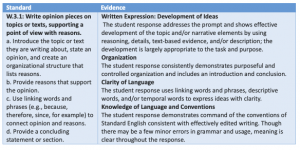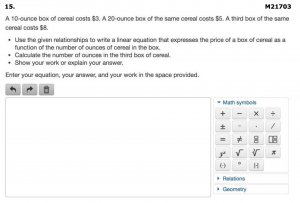Talking With Parents About Assessments
Parents and caregivers are crucial partners for student success.Parent and caregiver involvement is consistently found to be positively associated with a child’s academic performance1. Assessments provide a prime opportunity to talk with parents about how a student is progressing in their learning.
Below are steps and suggestions for how to facilitate this conversation, along with links to curated resources from our most trusted partners.
1. Share end-of-year expectations
At the beginning of and throughout the year, share with parents what students should know and be able to do by the end of the school year. There are several resources that can help you do this.
Parent Facing Resources
We’ve curated a list of parent-facing resources that help explain the knowledge and skills students need to gain at each grade level in parent- friendly language. These resources include:
- National PTA and Seek Common Ground for grade-specific family guides
- Be a Learning Hero for a beginning of year readiness check that can be given to students at home
- Khan Academy for video-based tutorials and practice at home
Evidence Statements
Sharing the standards that the assessment covers can be helpful for parents. However, Evidence Statements can help both parents and teachers better understand exactly what students might say or do to demonstrate mastery of the standards.
For example:

Sample items
Sharing the kinds of questions students may be asked to answer on the assessment is another way to help parents understand what is expected of their student this year. For samples of student work, check out these released items and see below for an 8th grade math example.

2. Let parents know when and why you are testing
It’s important to be transparent about testing in your classroom. Let parents know when and why you are testing and what topics, standards, and/or skills will be covered. Additionally, sharing how the results will be used is especially crucial. For example, will you use the results to inform instruction? To determine who needs extra support? When this kind of information is shared in advance of testing, it can help alleviate both parent and student concerns and texting anxiety. Then, let parents know when they can expect to see the results.
Sample email
Dear [name of parent/caregiver],
Over the last few [weeks/days] we have been working on [topic(s)] in [subject] class. On [date], I will be administering an assessment on [topic] that will help show if students learned what was covered in class or if they need more support.
[I/The [grade level] team, etc.] will look at student scores in order to [how you will use the data to inform instruction, provide support, etc.].
I will share [“name” or “your child”]’s assessment results with you on [date].
As always, please contact me with any questions at [email] or [phone].
Best,
[name of teacher]
3. Share assessment results
When talking about assessments and assessment results, it’s vital to remind parents that the results are just one measure of what a student knows and can do. As the teacher, you have a more complete picture of a student’s progress. It’s important to let parents know what the assessment results mean, if it’s consistent with what you see in class every day, what steps you plan to take based on the results, and what parents can do at home to support their student.
Sample email
Dear [name of parent/caregiver],
[name of student] recently took an assessment in [subject], and I’d like to share the results with you.
As you can see from the attached report, the assessment results show that [name of student] [is on track, is showing progress, needs support] in [description of standard/evidence].
These results are [consistent/not consistent] with what we see in class. For example, on [previous assignment], I noticed [evidence].
My next step is to [provide more practice, targeted interventions, or move ahead with [next subject/topic].
For extra practice at home, I would recommend [example of what to do at home, such as reading more informational texts like books about bugs, dinosaurs, or space].
I will continue to keep you posted on [name of student]’s progress. As always, please contact me with any questions at [email] or [phone].
Best,
[name of teacher]
1.Parent involvement and student academic performance: A multiple mediational analysis. January 2011. https://www.ncbi.nlm.nih.gov/pmc/articles/PMC3020099↩